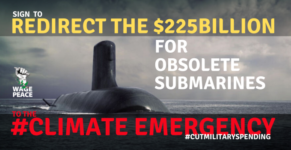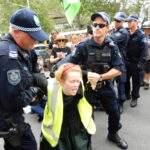Fund Climate Action, Not Submarines: An Interview With Wage Peace’s Margaret Pestorius

The eastern seaboard has been burning since September. And Australians are well aware that the bushfires that have since been gripping the whole continent are unprecedented in their length and ferocity.
The general public has also made the link between the catastrophe and the warnings around changing climate conditions that scientists have been putting out there for decades. These cautions have reached a crescendo over the last twelve months.
And the people have been rightfully disappointed in PM Scott Morrison, who has only just conceded that changing climate patterns caused by greenhouse gas emissions have played a part in what’s unfolding. That’s after vehemently arguing against the point for as long as he could get away with it.
But, imagine that while the government has hesitated over affording to pay volunteer fire fighters for their services, it’s already got a project underway that involves building a new fleet of attack-class submarines that will eventually cost an estimated $225 billion over the coming decades.
The theatre of the absurd
Well, in actuality, there’s no need to stretch your imagination, as the Coalition has long had its sights on upgrading the nation’s submarine fleet, with the Turnbull government awarding the contract to develop the dozen subs to French company Naval Group in April 2016.
Despite the French design and US components, the construction of the fleet has been spruiked as being all about Australian workers building Australian submarines with Australian steel. And the Australian public will only have to wait until sometime in the 2030s to see the first finished product.
The project was initially given a $50 billion price tag. However, the head of the submarine program Australian Navy rear admiral Greg Sammut stated last November that once inflation and the cost of maintaining the fleet are factored in the price for taxpayers will be up around $225 billion.
And these bizarre arrangements have led anti-war organisation Wage Peace to launch a campaign and online petition, calling on the government to redirect the money allocated for these submarines – which are said could by obsolete by 2050 – into funding climate action.
Sending in the troops
The government finally deployed 3,000 Australian Defence Force (ADF) troops to help with the bushfire crisis a few weeks back. Although, Scotty from Marketing came under some heavy scrutiny for releasing a social media advert praising the move just hours after it had been made.
And at a moment when it appears Washington is stinging to commence war with Tehran, the Australian Navy vessel HMAS Toowoomba set sail on Monday from Perth on its way to join US forces in the Persian Gulf with the aim of preventing Iranian interference with oil shipments.
Sydney Criminal Lawyers spoke to Wage Peace spokesperson Margaret Pestorius about the government’s reasoning behind its expensive submarines, the gains the climate movement has made of late, and how she believes the hundreds of billions of dollars could be better spent.
Firstly, when we last spoke at the end of 2017, you’d just appeared before the Alice Springs Supreme Court over a charge of unlawful entry into Pine Gap, as part of a demonstration against the installation.
There’s been a marked change in the political climate since then, especially over the last 12 months. Margaret, how would you describe the changes that have been happening locally during that time?
Since then, we’ve had Pine Gap operations confirmed by the Wikileaks and Snowden releases. We’ve probably had Pine Gap involved in the Soleimani assassination two weeks ago. So, looking from a Pine Gap perspective, it’s business as usual.
And we’ve also seen an enormous increase in the number of drone strikes in Afghanistan over the last year. So, it really has been business as usual from there.
But, of course, we’ve also got the climate emergency in our faces. And we’re seeing the results of that through the fires, and previously, through the bleaching of the Great Barrier Reef, and the other terrestrial events, such as the huge killings of bats in Cairns in 2018.
So, we’ve got the climate emergency in our faces and we’ve got this rising climate movement. It has really named the problem and put it in front of us. The Extinction Rebellion movement has been huge in making people wake up to climate.
If it hadn’t been for Extinction Rebellion, we could have had a situation again where people didn’t notice that these fires were a climate issue.
Over the last two years, we’ve also seen a systematic rise in militarism, with the $3 billion promised over twenty years. And we’ve seen Australia become the second biggest purchaser of weapons worldwide.
At present, Wage Peace is running a campaign calling on the government to redirect the $225 billion that’s set to be spent on submarines by 2050, so it can be invested into climate action.
Can you tell us a bit about what the Coalition government is actually proposing the nation invests in submarine-wise? And in your understanding, why is it doing this?
There are 12 submarines. And the first one is to be produced by 2035. The Naval Group has been chosen for their supposed ability to innovate, which essentially means that they’ll be making things up as they go.
The Naval Group are only making the subs. It will be US weapons systems. And the US are apparently not wanting to talk to the Naval Group about their weapons systems which are secret. They like to keep them secret from the French.
At the moment, the project is around $220 billion. But, that’s expected to continue rising. It was about $100 billion less 12 months ago.
The main reasons given for these subs are jobs and industry development. It’s the development of the capability to build submarines. But, the defence and strategic reasons are a little bit harder to find in the literature.
It’s quite contested inside defence. It’s contested between the air, sea and land departments, who are all vying for investment.
And it’s really not clear what these submarines are supposed to be for, especially as they don’t start until 2035.
There’s some belief that they will be obsolete by 2050. And they’re going to be rolling out for 20 to 30 years after the first one.
You’re saying that the government should be reinvesting this money into the unfolding climate emergency. In a practical sense, how do you suggest the money is better spent?
It has been good that the ADF have actually been doing something useful for the Australian people in that they were forced to respond to the current climate emergency issue: the fires.
That’s a good thing, to see them operating for something that’s actually useful. We want to see them retained or retrained for the real security threat to the safety and wellbeing of Australian people, which is the climate emergency.
Fires are part of it, but there’s also the drying out of the continent. And there are other aspects that need to be dealt with, including the loss of tree cover.
Our thinking is their logistics and capabilities have somehow got to be redirected – or at least their funding be redirected – to the enormous revegetating of this land that’s going to need to occur to restore it to the Dark Emu vision of Bruce Pascoe, which is a vision of this country related to how it was when the Europeans came here.
There’s the shifting of money and resourcing to a nature-based regeneration. We are going to need to see a Dark Emu vision. A regeneration of forests, soil and rivers.
As you’ve just mentioned, the Australian Defence Force has been sent in to help with fire efforts. What do you think about that development?
We would like to see the ADF serve Australia. But, we are sceptical that they can do that, because they are set up as an imperial force. Our concern would be that they will just be used as a PR effort to justify their existence as an imperial force.
So, it’s very tricky to think about how you get the ADF involved in restoration. Not fighting fires. But, some logistical support. Maybe not planting trees, but logistical support.
They have the capacity. Although, some of them will have to be retrained. But, some of the resources that have been directed into the military needs now to be redirected to the actual security threat.
The bushfire crisis is still upon us. Since it began back in September, the prime minister had stuck to his assertions that there was no link between the intensity of the fires and climate change.
That was until last Sunday, when Morrison conceded that there is a link between changing climate and the conditions that have led to the fires. But, in regard to policy, he said his party is simply going to “evolve” it, and pretty much left it at that.
What do you think about these most recent statements from the PM?
He’s been forced to make those statements. The movement has required him to make those statements. And this is the job of the movement.
This is how you can see the strength of the movement, as people like Morrison are having to move their position. They have to go with the people.
But, they will follow. When they are being forced, they will follow. They are following. They’re ten steps behind at least.
It’s been the Extinction Rebellion people, and the people who have been opposing the coal mines, who have set the narrative here. And the people of Australia have joined that narrative over the last few weeks with the events of the fires.
So, the PM’s statements mark a change that has been brought about by the movement.
I hope so. That’s what we look to do, to force those sorts of changes in what people say and do.
On Monday, the Australian naval ship HMAS Toowoomba began its way to the Middle East to join the US in defending oil shipments against Iranian interference in the Strait of Hormuz.
Considering the mounting tensions between the US and Iran over recent days, what do you think about our government sending in military support at this time?
For a start, we need war powers reform. The Greens have been looking for war powers reform. But, the idea that an executive can send a ship to war without the parliament’s involvement is extremely concerning.
It is dangerous. And we’ve seen that danger, because there’s already a disaster unfolding in the Middle East. What that man in the US has done is tear down the peace building that had occurred.
There was an amazing treaty in place that had resolved many simmering tensions in the Middle East, and he has systematically undermined and removed the operation of that treaty. That was the Iran nuclear deal.
What we are now seeing is the outcome of that with the downing of the Ukrainian plane. And we’ll see more of those ridiculous moves into war.
This is happening right at the moment as the Washington Post has revealed that the generals involved in the Iraq and Afghanistan wars were lying. They have put that on the public record.
Our generals are part of that lie. It includes our governor general David Hurley, who was the chief of defence right at the centre of those lies from 2011 to 2014.
Hurley must resign. He was the chief liar at that time. He was the Australian general who was supposed to be passing accurate information to the government and was not.
Hurley was lying about how successful they were. He was silent on the war crimes that were occurring. He was sending units back over and over again, even though they could not maintain the capability to do the job.
And now we are seeing the one suicide a week increasing in Australia.
And lastly, Margaret, your organisation is called Wage Peace, however the United States at present seems focused on waging wage with Iran. How do you see the mounting tensions playing out from here?
It’s hard to see it not escalating. We have to hope and pray that this current movement that we’ve got – the climate movement – has the strength to somehow transfer to a call for peace.
Now, that’s happening in the US. In the US, we have veterans. That’s pretty much the place where it’s going to happen. The veterans in the US are the people saying no to war. They’re the ones coming out – one after the other – and saying no.
The veterans are saying that the government shouldn’t be sending people to fight wars based on lies.







